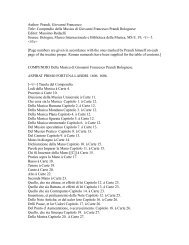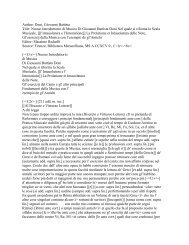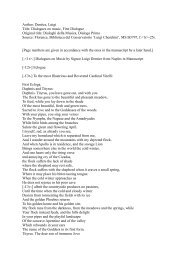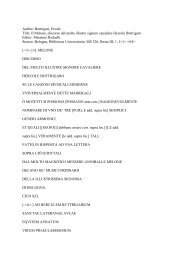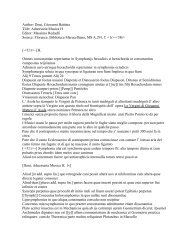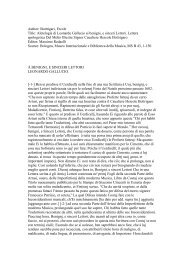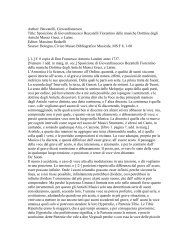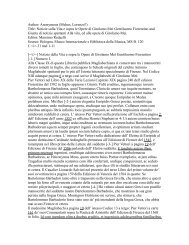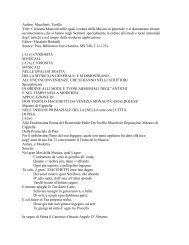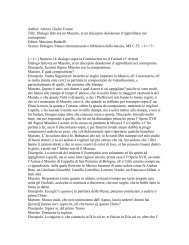Author: Doni, Giovanni Battista - manuscripts of italian music theory ...
Author: Doni, Giovanni Battista - manuscripts of italian music theory ...
Author: Doni, Giovanni Battista - manuscripts of italian music theory ...
You also want an ePaper? Increase the reach of your titles
YUMPU automatically turns print PDFs into web optimized ePapers that Google loves.
to do. Glareano was <strong>of</strong> this opinion, where, [first book, chapter eight in marg.]<br />
describing the intervals, he says: “The Tritone is a harsh sort <strong>of</strong> fourth and it is totally<br />
unsuited to the Diatonic genus.” In fact, although he was knowledgeable about <strong>music</strong><br />
and a very good humanist, nevertheless he did not have that culture and grasp <strong>of</strong> these<br />
matter that many believe that he had. Therefore, he cannot be entrusted with such<br />
authority. Therefore, I have to believe that the Tritone and the Semidiapente are<br />
excluded from the Diatonic genus, moreover, I believe that many prefer this genus<br />
than with the other because the harsh intervals are more suited to the genus that is<br />
harsher than the others [[for instance, secondarily because there are small intervals in<br />
it naturally, although they are not uncompounded but divided by others. For this<br />
reason I said that both <strong>of</strong> them suited the Diatonic.]]<br />
[--] Whether the Diatonic is natural and the other two genera are artificial<br />
After we have seen what the nature and the order <strong>of</strong> the three genera is, it is<br />
appropriate to consider the origin <strong>of</strong> each and their main properties and qualities. First<br />
<strong>of</strong> all, that nature itself is invented the Diatonic is agreed by everyone, because one<br />
can see that it is used commonly by everyone and that every simple peasant and rough<br />
shepherd who sings a song <strong>of</strong> his uses the Diatonic rather than any other genus. This, I<br />
believe, occurs in countries and among all nations with little variation, because one<br />
should not believe that everywhere everyone who has not been trained in the art <strong>of</strong><br />
singing sings exactly the same intervals and the same species <strong>of</strong> Diatonic, because<br />
nature delights <strong>of</strong> variety in every thing that belongs to her, as we shall see in the<br />
different traditions <strong>of</strong> the nations and in the very different languages that peoples use.<br />
Moreover, one can here some variety in the common songs which are sung, because<br />
sometimes one hears the larger semitone instead <strong>of</strong> the smaller one, although this is<br />
not enough for the melody to be able to be called chromatic, if that is the only<br />
Semitone. Therefore, the Diatonic is the most ancient <strong>of</strong> all, as the authors state as<br />
well. The second to be invented was the Chromatic, which is as much harder and<br />
subtler than the Diatonic as this is harder and subtler than the Enharmonic. Nor<br />
anyone can state as certain that it is used or it has ever been used by any nation as the<br />
natural genus. Finally, the Enharmonic is a thoroughly Greek invention, albeit it is<br />
also very ancient in origin, because it was found even in Homeric times [--]<br />
(according to the ancients) and before the Trojan War. Nevertheless, one must believe<br />
that it is more recent than the Chromatic, which is attributed to Timotheus, as we shall<br />
see soon. Therefore, the Enharmonic was a Greek invention and for this reason<br />
Plutarch, following the report <strong>of</strong> Aristoxenus, as I believe, calls the <strong>music</strong> practised by<br />
Pindar and by the others <strong>of</strong> that most florid and uncorrupted era [kala kai ellenika<br />
mousike], which means “the beautiful and Greek <strong>music</strong>.” However, it has to be noted<br />
that Aristoxenus, I believe, quoted by Plutarch maintains that a genus is not older that<br />
the other one by its own nature, but as to human practice and as to the occasion which<br />
presents itself. Therefore, just as the Diatonic can be sung by everyone with a little<br />
study and natural predisposition, thus the Chromatic requires greater artistry and<br />
application. Theon, following Aristoxenus authority says: [to de diatonon genos<br />
aploun ti kai gennaion kai mallon kata physin], which means that “the Diatonic genus<br />
has something <strong>of</strong> the simple, masculine and more akin ton nature which caused it to<br />
precede the others for this reason.” [--] The ancients say commonly about the<br />
diatonic that it is rather harsh and rather rustic, and, as Aristides says, that it has<br />
something <strong>of</strong> the “masculine and austere,” [arrenopon kai austeroteron]. He writes<br />
that the Chromatic is “very sweet and suited to laments” [hediston te kai goeron], and



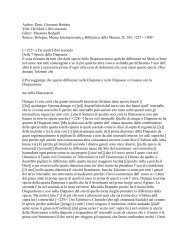
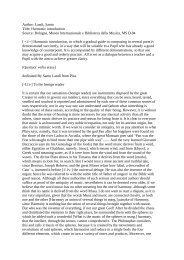
![Doni, Giovanni Battista Title: Trattato Dei Tuoni o [[Harmonie de]]](https://img.yumpu.com/45461005/1/190x245/doni-giovanni-battista-title-trattato-dei-tuoni-o-harmonie-de.jpg?quality=85)
